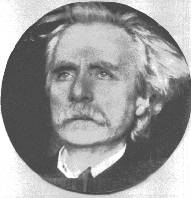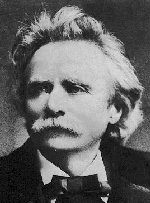Edward Grieg (1843-1907)
(born Bergen, 15 June 1843; died there, 4 Sept. 1907).
He studied with E.F. Wenzel at the Leipzig Conservatory (1858-62), where
he became intimately familiar with early Romantic music (especially Schumann's),
gaining further experience in Copenhagen and encouragement from Niels Gade.  Not
until 1864-5 and his meeting with the Norwegian nationalist Rikard Nordraak
did his stylistic breakthrough occur, notably in the folk-inspired
Humoresker
for piano op.6. Apart from promoting Norwegian music through concerts of
his own works, he obtained pupils, became conductor of the Harmoniske Selskab,
projected a Norwegian Academy of Music and helped found the Christiania
Musikforening (1871), meanwhile composing his Piano Concerto (1868) and
the important piano arrangements of 25 of Lindeman's folksongs (op.17,
1869). An operatic collaboration with Bjornson came to nothing, but his
incidental music to Ibsen's Peer Gynt (1875), the most extensive
and best known of his large compositions, produced some of his finest work.
Despite chronic ill-health he continued to tour as a conductor and pianist
and to execute commissions from his base at Troldhaugen (from 1885); he
received numerous international honours. Among his later works, The
Mountain Thrall op.32 for baritone, two horns and strings, the String
Quartet in g Minor op.27, the popular neo-Baroque
Holberg Suite
(1884) and the Haugtussa song cycle op.67 (1895) are the most distinguished.
Not
until 1864-5 and his meeting with the Norwegian nationalist Rikard Nordraak
did his stylistic breakthrough occur, notably in the folk-inspired
Humoresker
for piano op.6. Apart from promoting Norwegian music through concerts of
his own works, he obtained pupils, became conductor of the Harmoniske Selskab,
projected a Norwegian Academy of Music and helped found the Christiania
Musikforening (1871), meanwhile composing his Piano Concerto (1868) and
the important piano arrangements of 25 of Lindeman's folksongs (op.17,
1869). An operatic collaboration with Bjornson came to nothing, but his
incidental music to Ibsen's Peer Gynt (1875), the most extensive
and best known of his large compositions, produced some of his finest work.
Despite chronic ill-health he continued to tour as a conductor and pianist
and to execute commissions from his base at Troldhaugen (from 1885); he
received numerous international honours. Among his later works, The
Mountain Thrall op.32 for baritone, two horns and strings, the String
Quartet in g Minor op.27, the popular neo-Baroque
Holberg Suite
(1884) and the Haugtussa song cycle op.67 (1895) are the most distinguished.
 Grieg
was first and foremost a lyrical composer; his op.33 Vinje settings, for
example, encompass a wide range of emotional expression and atmospheric
colour, and the ten opus numbers of Lyric Pieces for piano hold
a wealth of characteristic mood-sketches. But he also was a pioneer, in
the impressionistic uses of harmony and piano sonority in his late songs
and in the dissonance treatment in the Slatter op.72, peasant fiddle-tunes
arranged for piano.
Grieg
was first and foremost a lyrical composer; his op.33 Vinje settings, for
example, encompass a wide range of emotional expression and atmospheric
colour, and the ten opus numbers of Lyric Pieces for piano hold
a wealth of characteristic mood-sketches. But he also was a pioneer, in
the impressionistic uses of harmony and piano sonority in his late songs
and in the dissonance treatment in the Slatter op.72, peasant fiddle-tunes
arranged for piano.
 Not
until 1864-5 and his meeting with the Norwegian nationalist Rikard Nordraak
did his stylistic breakthrough occur, notably in the folk-inspired
Humoresker
for piano op.6. Apart from promoting Norwegian music through concerts of
his own works, he obtained pupils, became conductor of the Harmoniske Selskab,
projected a Norwegian Academy of Music and helped found the Christiania
Musikforening (1871), meanwhile composing his Piano Concerto (1868) and
the important piano arrangements of 25 of Lindeman's folksongs (op.17,
1869). An operatic collaboration with Bjornson came to nothing, but his
incidental music to Ibsen's Peer Gynt (1875), the most extensive
and best known of his large compositions, produced some of his finest work.
Despite chronic ill-health he continued to tour as a conductor and pianist
and to execute commissions from his base at Troldhaugen (from 1885); he
received numerous international honours. Among his later works, The
Mountain Thrall op.32 for baritone, two horns and strings, the String
Quartet in g Minor op.27, the popular neo-Baroque
Holberg Suite
(1884) and the Haugtussa song cycle op.67 (1895) are the most distinguished.
Not
until 1864-5 and his meeting with the Norwegian nationalist Rikard Nordraak
did his stylistic breakthrough occur, notably in the folk-inspired
Humoresker
for piano op.6. Apart from promoting Norwegian music through concerts of
his own works, he obtained pupils, became conductor of the Harmoniske Selskab,
projected a Norwegian Academy of Music and helped found the Christiania
Musikforening (1871), meanwhile composing his Piano Concerto (1868) and
the important piano arrangements of 25 of Lindeman's folksongs (op.17,
1869). An operatic collaboration with Bjornson came to nothing, but his
incidental music to Ibsen's Peer Gynt (1875), the most extensive
and best known of his large compositions, produced some of his finest work.
Despite chronic ill-health he continued to tour as a conductor and pianist
and to execute commissions from his base at Troldhaugen (from 1885); he
received numerous international honours. Among his later works, The
Mountain Thrall op.32 for baritone, two horns and strings, the String
Quartet in g Minor op.27, the popular neo-Baroque
Holberg Suite
(1884) and the Haugtussa song cycle op.67 (1895) are the most distinguished.
 Grieg
was first and foremost a lyrical composer; his op.33 Vinje settings, for
example, encompass a wide range of emotional expression and atmospheric
colour, and the ten opus numbers of Lyric Pieces for piano hold
a wealth of characteristic mood-sketches. But he also was a pioneer, in
the impressionistic uses of harmony and piano sonority in his late songs
and in the dissonance treatment in the Slatter op.72, peasant fiddle-tunes
arranged for piano.
Grieg
was first and foremost a lyrical composer; his op.33 Vinje settings, for
example, encompass a wide range of emotional expression and atmospheric
colour, and the ten opus numbers of Lyric Pieces for piano hold
a wealth of characteristic mood-sketches. But he also was a pioneer, in
the impressionistic uses of harmony and piano sonority in his late songs
and in the dissonance treatment in the Slatter op.72, peasant fiddle-tunes
arranged for piano.